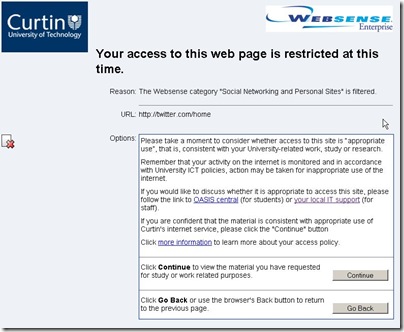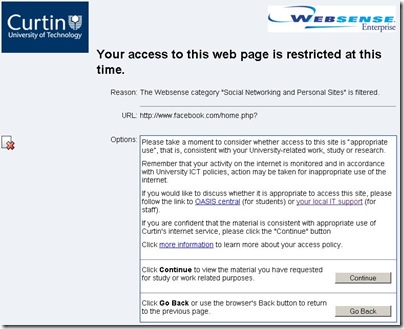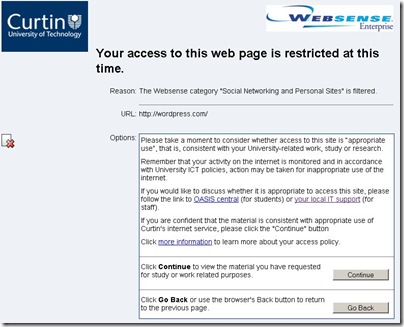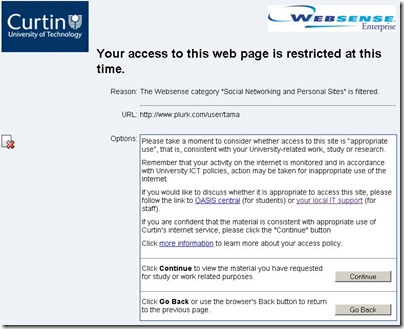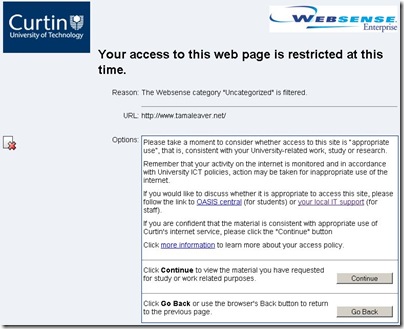Home » facebook (Page 17)
Category Archives: facebook
Annotated Digital Culture Links: April 17th 2009
Links for April 14th 2009 through April 17th 2009:
- Digging up dirt: Facebook spies for hire [The Age] – “Large companies and government departments are employing a new Sydney-based company to dig up dirt on staff by spying on Facebook, MySpace, Twitter and YouTube posts. SR7 specialises in “online risk and reputation management” and claims to be the only company in Australia that actively monitors social networking sites on behalf of companies. It was formed about eight months ago in response to the growing trend for people to take conversations they would have traditionally had with mates at the pub on to their social network profiles. Few people realise these seemingly private sites are still public spaces. If controversial posts leak to the media, it can lead to brands suffering immense damage to their reputations. SR7 director James Griffin said business was booming following recent public relations disasters sparked by the stupid social network behaviour of a few rogue employees.” (The golden rule: if it’s online, presume it’s public!)
- Twitter activist goes into hiding [The Age] – “The woman behind the mass protests which rocked the capital of Moldova last week has gone into hiding after the so-called “Twitter Revolution” forced a recount of the general election. Natalia Morar, 25, a Moldovan who has already been banned from Russia for opposing the Kremlin, feared arrest after organising a flash mob which ended with 20,000 people storming the parliament building. Protests began after a conversation between Ms Morar and six friends in a cafe in Chisinau, Moldova’s tiny capital, on Monday, April 6, the day after the parliamentary elections. The elections brought a larger-than-expected victory for the incumbent Communist Party. Suspecting vote-rigging, “we decided to organise a flash mob for the same day using Twitter, as well as networking sites and SMS,” …With no recent history of mass protests in Moldova, “we expected at the most a couple of hundred friends, friends of friends, and colleagues”, she said. “When we went to the square, there were 20,000 people””
- Twitter Gets the Oprah Treatment [Bits Blog – NYTimes.com] – “It is the universal sign of a new idea going mainstream: Oprah Winfrey is bestowing her endorsement on Twitter. The woman who can single-handedly send a new product or book flying off the shelves has just joined Twitter.” I can’t wait for Oprah’s tweet of the month … 😛
- Disney Templates is Today’s BIG Thing – APR 07, 2009 [Video] – “Looks like the Disney Vault has a purpose after all – to keep us from realizing how similar our favorite classic Disney movies truly are. According to this video, Disney only ever made one movie, and they’ve been tracing it ever since.” [Via]
Annotated Digital Culture Links: April 9th 2009
Links for April 6th 2009 through April 9th 2009:
- on url shorteners [joshua’s blog] – “… URL shorteners are bad for the rest of us. The worst problem is that shortening services add another layer of indirection to an already creaky system. A regular hyperlink implicates a browser, its DNS resolver, the publisher’s DNS server, and the publisher’s website. With a shortening service, you’re adding something that acts like a third DNS resolver, except one that is assembled out of unvetted PHP and MySQL, without the benevolent oversight of luminaries like Dan Kaminsky and St. Postel. There are three other parties in the ecosystem of a link: the publisher (the site the link points to), the transit (places where that shortened link is used, such as Twitter or Typepad), and the clicker (the person who ultimately follows the shortened links). Each is harmed to some extent by URL shortening.” (While I understand URL shortening for Twitter, I think they tend to obscure the actual destination and make evaluating a link very difficult!)
- Facebook Blocks All Pirate Bay Links [TorrentFreak] – “… [in] March The Pirate Bay added new functionality to reach out to millions of Facebook users. Just over a week later and the world’s largest social networking site has blocked all links to torrents on the world’s largest and most infamous BitTorrent tracker. It was less than two weeks ago when The Pirate Bay implemented a new feature making it easier for site users to post links to torrents on their Facebook profile… The entertainment industries were not happy with the new feature, but since The Pirate Bay is not exclusively used to spread copyrighted material, there wasn’t much they could do about it. Facebook users responded positively and many began posting torrent links in their profile. This integration of the world’s largest tracker and the world’s largest social networking site generated hundreds of news articles and excitement. But it wasn’t to last. This morning Facebook … blocked not only the feature, but all links to Pirate Bay’s torrents.”
- Flutter: The New Twitter [YouTube] – When the 140 characters of Twitter get too much, the nanoblogging revolution of Flutter might be right for you! 😉
Curtin’s Internet Filtering and Blocking
How much does your educational institution filter the internet, especially if you’re at tertiary level (because K-12 filtering has other issues attached to it)? I ask because in my recent shift to Curtin, I’ve discovered the joys of university-level internet filter, something that didn’t happen at my previous institution. The list of blocked or click-thru site (ie not completely blocked, but having a warning message asking if you really need this website) seems to alter week to week. This morning, every time I want to visit Twitter, Plurk, Facebook or even a wordpress.com blog, I have to click through a warning page; every time I reload, I have to click through a warning page. Apart from being highly frustrating, I’m currently redesigning several units which are thematically linked by the concept of web presence; almost everything I want students to look at will have these warnings on the Curtin network. I wonder how many students will get frustrated and give up on the unit? This morning’s blocks so far …
Ironic Update: The first attempt to upload this blog post from my work computer led me to discover that even this website is blocked now:
I wonder what sort of hoops I’m going to have to jump through to try and fix this? 🙁
Update 2: Most of the blocking seems to have magically stopped as suddenly as it began about 12 hours ago so, being generous, I’d like to believe this was an accidental blocking … I’d really like to believe that …
Annotated Digital Culture Links: March 20th 2009
Links for March 19th 2009 through March 20th 2009:
- The Hugo Awards : 2009 Hugo Award Nominations – Doctor Horrible’s Sing-Along Blog is up for a 2009 Hugo for Best Dramatic Presentation, Short Form. That’s quite an achievement for a web one-off!
- 94% of Facebook users hate new design – web – Technology – theage.com.au – “Facebook’s redesign is getting an emphatic thumbs down from the notoriously change-wary users of the social network. Ninety-four per cent of the nearly 800,000 Facebook users who have voted in a poll on the site said they do not like the changes rolled out in the past two weeks. Only six per cent said they approve the redesign. Among those writing comments alongside the poll, user Nik McCarthy said the change “Pretty much sucks. Better before.”” (Interesting use of stats, but, yes, new Facebooktwitter design is silly. Very silly.)
- (fake?) ACMA Blacklist leaked; citizens threatened with prosecution [nic.suzor.com] – Nic asks a very good question: “The list is apparently from late last year, and contains just over two thousand URLs (about double the size of the current list). On the list are some sites which look like they may possibly contain some child sexual abuse material. Unfortunately, there are also a very high number of innocuous sites – dentists, tuckshops, dog kennels, favourite collections of lolcats. Reports are coming out that these sites may have been hacked in the past and found their way on to the blacklist. This raises an immediate problem – what happens when the website owner fixes its security hole and removes prohibited content? How do you (a) find out you’re on the blacklist; and then (b) get your site removed?”
Annotated Digital Culture Links: February 16th 2009
Links for February 9th 2009 through February 16th 2009:
- Vigilantes publish alleged arsonist’s image online [The Age] – “Facebook vigilantes, frustrated at a court order protecting a man charged with lighting one of the deadly Victorian bushfires, which killed at least 11 people, have published his photograph and address on the social networking site and threatened his life. The move potentially breaches an order suppressing his image and address amid fears of a violent backlash by angry victims. Victoria Police has contacted Facebook seeking the removal of the details and urged people to let police do their job. This morning the suppression order on naming the man, Brendan Sokaluk, 39, was lifted, but the order remains in place on publishing his street address or his image. At least two Facebook groups have been created to name and shame the alleged arsonist, and thousands of Facebook users have joined them. Membership is growing rapidly as word spreads.” (While I completely understand people’s anger, this sort of social networking lynch mob mentality is really quite dangerous.)
- Fair Use Held Hostage by ABC-Disney [Just TV] – Jason Mittell’s tale of how aquiring copyright permission from ABC/Disney for a cover image for his new book, Television and American Cuture, became a debacle with Disney refusing to license the cover image unless the publishers licensed every internal Disney image – something that should be covered by fair use – but with the book already at the printers, the publishers gave into Disney’s demands. As Mittell notes, Disney are legally able to do this, but it’s a bit of a slap in the face for fair and educational uses.
- Murdoch looks for new ways to monetise MySpace traffic [The Age] – “”Rupert Murodch has delivered a sobering assessment about the internet as a growth engine, revealing search and advertising revenues at News Corp’s Fox Interactive Media division – which houses the popular MySpace networking site – have stalled. The new-media unit, which has invested heavily to expand MySpace, contributed just $US7 million ($10.4 million) to News Corp’s $US818 million second-quarter operating income, the company said on Friday. There was a “slight downturn” in revenue at the social networking site, Mr Murdoch said. That compares to $US179 million News Corp made from newspapers including The Wall Street Journal and information services such as the Dow Jones news wire. Asked about his views on the long-term viability of the internet, Mr Murdoch said generating a return on investment for assets such as MySpace, which News Corp bought for $US580 million in 2005, was still a challenge. “I think we have to find new ways to monetise our huge audiences,” he told analysts.”
Annotated Digital Culture Links: February 8th 2009
Links for February 5th 2009 through February 8th 2009:
- Journalism Education’s Future: Broader, Deeper in Community [Center for Citizen Media] – Dan Gillmor, on the challenge for journalism educators in the C21st: “Journalism educators should be in the vanguard of an absolutely essential shift for society at large: helping our students, and people in our larger communities, to navigate and manage the myriad information streams of a media-saturated world.We need to help them understand why they need to become activists as consumers — by taking more responsibility for the quality of what they consume, in large part by becoming more critical thinkers. And they need to understand their emerging role as creators of media.
In both cases, as consumers and creators, we start with principles.
For media consumers:
• Be Skeptical
• Exercise Judgement
• Open Your Mind
• Keep Asking Questions
• Learn Media TechniquesFor media creators (after incorporating the above):
• Be Thorough
• Get it Right
• Insist on Fairness
• Think Independently
• Be Transparent, Demand Transparency” - Stimulus package Facebook activism [Larvatus Prodeo] – “Thanks to commenter Bird of paradox on a previous thread for drawing my attention to the creation of a Facebook group “Come on Turnbull, don’t take away my $950 bucks !”. As of this morning, it was the largest political Facebook group in Australia with 5000 members and a goal of 8000 by 9pm tonight. They’ll easily reach that. When I checked in five minutes ago, there were 7887 members. Another 60 have joined now. The group creator describes his motivation this way: ‘We are sending a clear message that Australians need this boost. As a uni student I need help to buy my text books, my mother is a single parent who needs help and my brother is heading into year 12 and he needs it… Think about how much difference this bonus will make to you and your families…’ The group page also provides information on how to lobby Senators. Very interesting indeed.” (Checking today there were more than 34,000 members!)
- Australians desert MySpace for Facebook [The Age] – “Facebook celebrates its fifth birthday this week and the company has much to crow about, as new figures reveal the social network has twice as many monthly users in Australia as its nearest competitor, MySpace. According to web traffic monitor Nielsen Online, Facebook attracted 4,682,000 unique visitors in December, compared with just 2,362,000 for MySpace. Furthermore, each Facebook user viewed 381 pages on Facebook but MySpace users looked at only 252 pages.
The figures show Australians appear to be deserting MySpace for Facebook … In Britain, the BBC reports, Facebook has 17 million users or three times as many as MySpace. Globally, ComScore released figures late last month showing 222 million people visited Facebook in December, versus 125 million for MySpace.”
Talking about Facebook & Privacy with RTR FM
 I was interviewed this morning on Perth’s RTR FM about privacy concerns raised in light of media reports that Facebook plans “to exploit the vast amount of personal information it holds on its 150 million members by creating one of the world’s largest market research databases.” While the reports themselves might have overstated the case in this instance, I’m constantly surprised by how little thought most users of social networking sites give to their own privacy; I’m equally dismayed when it comes as a revelation to people that Facebook is actually about trying to make money – it’s a business, not philanthropy! That said, any chance to get people thinking a bit more about the digital footprints they leave is a good thing and I enjoyed the this morning’s chat on the air. If you want you can access ‘Facebook is evil now?’ on RTR’s website, on click here for an mp3 of the interview (10 minutes, around 9Mb).
I was interviewed this morning on Perth’s RTR FM about privacy concerns raised in light of media reports that Facebook plans “to exploit the vast amount of personal information it holds on its 150 million members by creating one of the world’s largest market research databases.” While the reports themselves might have overstated the case in this instance, I’m constantly surprised by how little thought most users of social networking sites give to their own privacy; I’m equally dismayed when it comes as a revelation to people that Facebook is actually about trying to make money – it’s a business, not philanthropy! That said, any chance to get people thinking a bit more about the digital footprints they leave is a good thing and I enjoyed the this morning’s chat on the air. If you want you can access ‘Facebook is evil now?’ on RTR’s website, on click here for an mp3 of the interview (10 minutes, around 9Mb).

